| |||||||||||||||||
| |||||||||||||||||
| |||||||||||||||||
 |
|---|
Presidential elections were held in Georgia on 26 May 1991. [1] The result was a victory for Zviad Gamsakhurdia of the Round Table-Free Georgia party, who received 88% of the vote, with an 83% turnout. [2]
| |||||||||||||||||
| |||||||||||||||||
| |||||||||||||||||
 |
|---|
Presidential elections were held in Georgia on 26 May 1991. [1] The result was a victory for Zviad Gamsakhurdia of the Round Table-Free Georgia party, who received 88% of the vote, with an 83% turnout. [2]
The position of President of the Republic was introduced on 14 April by the Supreme Council at the request of Zviad Gamsakhurdia. On the same day the Supreme Council elected Gamsakhurdia as interim president. [3]
On 14 April the Supreme Council also issued a decree that presidential elections would be held based on universal, equal, and direct voting by secret ballot on 26 May. The decree instructed the Central Election Commission to ensure the conduct of the presidential elections.
Archil Chirakadze was appointed as the Chairman of the Central Election Commission, and L. Chirakadze served as the Secretary of the commission. The Central Election Commission established the schedule for the presidential elections, which included the submission of applications to nominate candidates, the submission of supporter lists for presidential candidates, the review and correction of those lists, the completion of candidate registration, and the conduct of election campaigns.
On 18 April the law governing the presidential elections was adopted.
The elections were held using the two-round system and required voter turnout to be at least 50% to validate the result.
On 24 April the Central Election Commission convened to discuss presidential candidates, announcing nine candidates. All nominated presidential candidates were granted the right to collect lists of supporting voters. According to the law, these lists, which needed at least 10,000 signatures from voters, had to be submitted to the Central Election Commission for the registration of presidential candidates no later than 2 May at 22:00.
It was noted at the commission meeting that the application for Jaba Ioseliani to be a presidential candidate was not received from the group of voters because it was submitted after the Supreme Council adopted amendments to the law "On Elections of the President of the Republic of Georgia." According to this amendment, individuals against whom preventive measures, such as imprisonment, had been applied were prohibited from participating in the elections. Consequently, the initiative group nominating this candidacy was not permitted to collect lists of supporting voters.
On 26 April the Central Election Commission held another meeting to discuss the initiative group's application to nominate Jaba Ioseliani as a presidential candidate. The statement alleged that incorrect information regarding the deadline for submitting the necessary documents was conveyed through the mass media, and the commission had made an illegal decision since the amendment to the law "On Elections of the President of the Republic of Georgia" was enacted after the application had been submitted. The group argued that the amendment contradicted the Constitution of the Republic of Georgia.
The Central Election Commission reaffirmed the legality of its earlier decision and explained that the application to nominate Jaba Ioseliani as a presidential candidate was presented to the commission on 23 April, in the afternoon, after the amendment to the election law was enacted. The document submitted on 22 April was incomplete, lacking the candidate's consent to run and a copy of his birth certificate. Therefore, the Election Commission did not recognize Jaba Ioseliani's candidacy on 22 April which was communicated to the initiative group.
By the end of the registration process for the presidential elections, six candidates were identified:
| Candidate | Party | ||
|---|---|---|---|
 | Zviad Gamsakhurdia | Round Table - Free Georgia | |
 | Irakli Shengelaia | Freedom Bloc | |
| Jemal Mikeladze | Communist Party of Georgia | ||
| Valerian Advadze | Concord, Peace, Revival Bloc | ||
| Tamaz Kvachantiradze | Democratic Georgia Bloc | ||
| Nodar Natadze | People's Front | ||
Roin Liparteliani was refused registration because fewer than 10,000 signatures from his supporters were submitted to the Central Election Commission by the established deadline. Givi Korghanashvili withdrew his candidacy before presenting the required signatures. Kartlos Gharibashvili did not submit any supporting signatures to the Central Election Commission.
Presidential elections were held without hindrance in the Abkhazian ASSR. Polling stations were established in the Russian cities of Moscow and Leningrad to facilitate the presidential elections of the Republic of Georgia.
International supervisors were invited to observe the presidential elections in Georgia and stated that the elections expressed free will and proceeded according to universally accepted democratic norms. They reported that there were no instances of voter influence or obstruction of the electoral process, although some supervisors noted minor deviations and violations that did not impact the overall electoral process, voting, or the final election results. Given the limited experience with democratic elections in Georgia, the supervisors deemed the organization of the elections to be excellent.
| Candidate | Party | Votes | % | |
|---|---|---|---|---|
| Zviad Gamsakhurdia | Round Table—Free Georgia | 2,565,362 | 87.58 | |
| Valerian Advadze | Concord, Peace, Revival Bloc | 240,243 | 8.20 | |
| Jemal Mikeladze | Communist Party of Georgia | 51,717 | 1.77 | |
| Nodar Natadze | People's Front | 36,266 | 1.24 | |
| Irakli Shengelaia | Freedom Bloc | 26,886 | 0.92 | |
| Tamaz Kvachantiradze | Democratic Georgia Bloc | 8,553 | 0.29 | |
| Total | 2,929,027 | 100.00 | ||
| Valid votes | 2,929,027 | 98.66 | ||
| Invalid/blank votes | 39,918 | 1.34 | ||
| Total votes | 2,968,945 | 100.00 | ||
| Registered voters/turnout | 3,594,810 | 82.59 | ||
| Source: Nohlen et al. | ||||

Zviad Konstantines dze Gamsakhurdia was a Georgian politician, human rights activist, dissident, professor of English language studies and American literature at Tbilisi State University, and writer who became the first democratically-elected President of Georgia in May 1991.
Ballot access are rules and procedures regulating the right to candidacy, the conditions under which a candidate, political party, or ballot measure is entitled to appear on voters' ballots in elections in the United States.

The president of Georgia is the ceremonial head of state of Georgia as well as the commander-in-chief of the Defense Forces. The constitution defines the presidential office as "the guarantor of the country's unity and national independence."

JabaIoseliani was a Georgian politician, member of Parliament of Georgia, writer, thief-in-law and leader of the paramilitary organisation Mkhedrioni.

The Mkhedrioni was a paramilitary group in the Republic of Georgia, known for its high-profile involvement in the Georgian Civil War and the War in Abkhazia. It was outlawed since 1995 but subsequently reconstituted as the Union of Patriots political party. However, failing to secure registration, it soon faded into obscurity.

The single-chamber Parliament of Georgia has 150 members, elected for a four-year term through elections. The last presidential elections were held in October 2018 due to constitutional changes taking effect in 2024, after which the president will be elected for a five-year term by a parliamentary college of electors. The series of constitutional changes, initiated in 2017, stipulated a one-time transitional presidential term of six years for 2018–2024. Other major systemic changes included a move to a fully proportional system by 2024 with a 5% threshold.
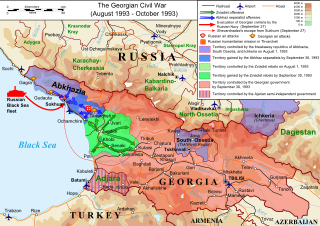
The Georgian Civil War lasted from 1991 to 1993 in the South Caucasian country of Georgia. It consisted of inter-ethnic and international conflicts in the regions of South Ossetia and Abkhazia, as well as the violent military coup d'état against the first democratically-elected President of Georgia, Zviad Gamsakhurdia, and his subsequent uprising in an attempt to regain power.

Tengiz Kitovani was a Georgian politician and military commander with high-profile involvement in the Georgian Civil War early in the 1990s when he commanded the National Guard of Georgia.
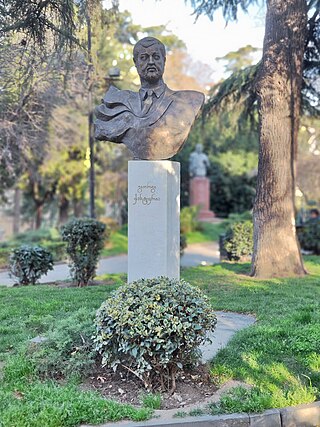
Giorgi Chanturia was a Georgian politician and the National Democratic Party leader who was murdered in Tbilisi, Georgia in December 1994.

Tengiz Sigua was a Georgian politician who served as Prime Minister of Georgia from 1992 to 1993.
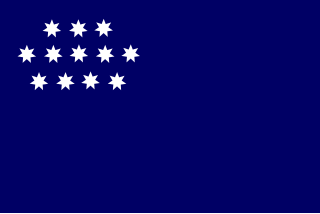
The Democratic Union for Revival was a political party in Georgia. The party acquired its current name in 1998, having operated since 1992 under the chairmanship of Aslan Abashidze and the name "Adjaran Union for the rebirth of Georgia".
The Georgian Armed Forces mutiny of October 1998 was an abortive attempt of a rebellion organized by a group of officers led by Colonel Akaki Eliava in western Georgia against the government of President Eduard Shevardnadze.

The Parliament of Georgia is the supreme national legislature of Georgia. It is a unicameral parliament, currently consisting of 150 members elected through fully proportional election.
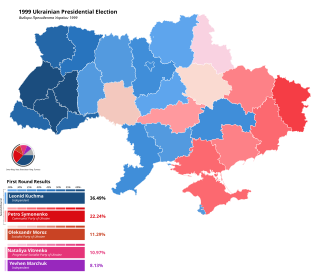
Presidential elections were held in Ukraine on 31 October 1999, with a second round on 14 November. The result was a victory for Leonid Kuchma, who defeated Petro Symonenko in the run-off, winning a second consecutive presidential election.

Presidential elections were held in Abkhazia on 3 October 2004, the first that were competitive. Election law prohibited incumbent President Vladislav Ardzinba from running for a third term and he instead backed Prime Minister Raul Khadjimba, who also enjoyed support from the Russian authorities. Khadjimba's main opponent was Sergei Bagapsh, who was supported by the two major opposition parties, United Abkhazia and Amtsakhara, and later also by Aitaira when their candidate Alexander Ankvab was barred from running in a controversial decision by the Central Election Commission.

An independence referendum was held in the Republic of Georgia on 31 March 1991. It was approved by 99.5% of voters.

Parliamentary elections were held in the Georgian SSR on 28 October 1990, with a second round on 11 November. They were the first free parliamentary elections in Georgia since 1919 and saw Round Table-Free Georgia emerge as the largest party in Parliament with 155 of the 250 seats. Voter turnout was 70%.

General elections were held in Georgia on 11 October 1992, in which voters elected both the Parliament and the Chairman of Parliament, who also acted as Head of State as the President, Zviad Gamsakhurdia, was in exile after being ousted in a coup in January. Independent candidate Eduard Shevardnadze was the only candidate in the election for Head of State, whilst the Peace Bloc won the most seats in Parliament. Voter turnout was 74.2%.

The 1991–1992 Georgian coup d'état, also known as the Tbilisi War, or the Putsch of 1991–1992, was an internal military conflict that took place in the newly independent Republic of Georgia following the fall of the Soviet Union, from 22 December 1991 to 6 January 1992. The coup, which triggered the Georgian Civil War, pitted factions of the National Guard loyal to President Zviad Gamsakhurdia against several paramilitary organizations unified at the end of 1991 under the leadership of warlords Tengiz Kitovani, Jaba Ioseliani and Tengiz Sigua.
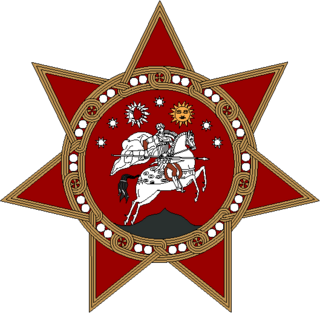
State Council of the Republic of Georgia was a temporary supreme governing body of the country, which was established in 1992 after the self-liquidation of the Military Council of the Republic of Georgia.